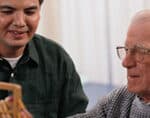
At Oxnard Family Circle, we have a large number of Memory Care patients who have been diagnosed with Alzheimer’s or other forms of dementia. We and the caregivers of our dementia participants are anxiously waiting for a cure; sitting on the edge of our seats for glimmers of hope. We want to see our loved ones’ confusion disappear and have their memories be preserved. We want to save the person trapped inside of dementia escape and be healthy and happy.
A participant at Oxnard Family Circle named Phil* experienced this feeling as his wife was diagnosed with Alzheimer’s. When Phil himself was diagnosed, he instantly decided that he wanted to donate his body to science after he passed in order to help researchers better understand Alzheimer’s disease. The doctor explained to him that he could technically donate his body to science now if he agreed to participate in a study to help find the cure for Alzheimer’s.
Phil was launched into a double-blind study and has been participating in the study for the past two years. He receives an injection once approximately every thirty days. He is 93 years old.
What has been the outcome of these studies?
According to his grandson (who provides care for Phil along with his mother and wife) the treatment has stunted the growth of Alzheimer’s in Phil’s brain. “About three days prior to his next injection, he feels more lethargic than usual, but after the injection it is amazing what he can remember” says his grandson. If Phil watches a movie with his grandson one day, he will be able to remember the movie that he has seen. With some prompting, he is usually able to remember the plot of the movie. He cannot prepare his own meals but he can specify if he needs a larger spoon or if the meal is too hot or cold. Phil remembers a substantial amount of his past (“Everything before World War I”, says his grandson) and only veers off on stories of violence.
Phil experiences Sundowner’s syndrome, an ailment that causes symptoms of confusion after “sundown.” (These symptoms appear in people who suffer from Alzheimer’s Disease or other forms of dementia. Not all patients who suffer from dementia or Alzheimer’s exhibit Sundowner’s symptoms, however. Conversely, some people exhibit symptoms of dementia all day which grow worse in the late afternoon and evening, while others may exhibit no symptoms at all until the sun goes down). Phil cannot sleep very well during the evenings but can process that it is nighttime if it is explained to him.
Phil is still strong physically; he is able to exercise and participates in physical therapy. Despite the fact that he came down with pneumonia last winter, he healed remarkably well. Phil’s grandson says that the quality of Phil’s memory has vastly improved since he started receiving treatments. “Sometimes he even ends up reminding me when I forget things!” his grandson laughs.
Phil will continue receiving treatment for Alzheimer’s until the end of his life. His experience and dedication to helping others with this disease is proof that the Alzheimer’s community has hope, and that with time and perseverance, dementia and Alzheimer’s WILL be cured. Oxnard Family Circle would like to thank Phil and his family for allowing his story to be shared.
*name has been changed for confidentiality
- How Can Seniors with Parkinson’s Disease Get Daily Support? - May 9, 2025
- What Can Physical Therapy Do for Seniors with Arthritis? - April 25, 2025
- How Does Adult Day Health Care Help Veterans Stay Safe at Home? - April 8, 2025

